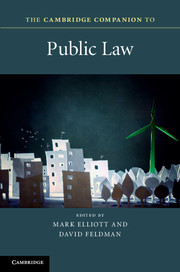Book contents
- Frontmatter
- Contents
- Notes on Contributors
- Introduction
- 1 The distinctiveness of public law
- 2 The politics of public law
- 3 The rule of law in public law
- 4 Legislative supremacy in a multidimensional constitution
- 5 The politics of accountability
- 6 Rights and democracy in UK public law
- 7 Public law values in the common law
- 8 Public law and public laws
- 9 Public law and privatisation
- 10 State architecture: subsidiarity, devolution, federalism and independence
- 11 Soft law never dies
- 12 The impact of public law litigation
- 13 Designing and operating constitutions in global context
- Index
- References
1 - The distinctiveness of public law
Published online by Cambridge University Press: 05 September 2015
- Frontmatter
- Contents
- Notes on Contributors
- Introduction
- 1 The distinctiveness of public law
- 2 The politics of public law
- 3 The rule of law in public law
- 4 Legislative supremacy in a multidimensional constitution
- 5 The politics of accountability
- 6 Rights and democracy in UK public law
- 7 Public law values in the common law
- 8 Public law and public laws
- 9 Public law and privatisation
- 10 State architecture: subsidiarity, devolution, federalism and independence
- 11 Soft law never dies
- 12 The impact of public law litigation
- 13 Designing and operating constitutions in global context
- Index
- References
Summary
The nature of the problem
Attaching the adjective ‘public’ to ‘law’ suggests that one is making two distinctions: first, between ‘public law’ and ‘non-public law’; secondly, between ‘public law’ and other tools for organizing the ‘public’ domain. This chapter attempts to identify what, if anything, distinguishes ‘public law’ in each of these ways. It suggests that the distinctions are loose, because they are drawn for different reasons and in different historical and institutional settings. When trying to make the various dividing lines coalesce, one inevitably produces a line which is blurry and wobbly, rather than one that is sharp and clearly focused. When such a line is converted into norms and those norms are applied to problems in the world, we should not be surprised or disappointed that they often leave room for doubt as to how to classify a particular issue, institution, process or claim. Recognizing that reality, however, does not entail discarding the idea that there are fundamentally important differences between law and non-law and between the public and non-public domains. There are core areas in which the classification is not in doubt, and, when it is contested, the dispute alerts us to the need to think hard about which norms and processes ought properly to be used in the circumstances. When people feel unease when trying to select mechanisms and rules with which to resolve controversies, we know that we are in the blurry area, and need to refer to meta-legal norms in order to clarify the issue.
When and why do the distinctions matter? From a practical lawyer's point of view, the distinctiveness of ‘public law’ matters when a state has a special procedure for implementing ‘public law’, or special rules of ‘public law’, or both. One needs to be able then to decide, and advise clients (who may be governmental bodies or ordinary people) as to whether it is more appropriate, or better for the client, to have an issue treated as one of ‘public’ rather than ‘non-public’ law, or as properly allocated to ‘non-law’ techniques of resolution, whether public or private. Lawyers advising clients want to help the clients to get the best possible outcome from their point of view. For individuals confronting governmental bodies, this usually means getting the best result in the particular case.
- Type
- Chapter
- Information
- The Cambridge Companion to Public Law , pp. 17 - 36Publisher: Cambridge University PressPrint publication year: 2015

